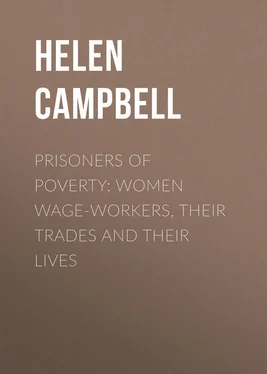Helen Campbell - Prisoners of Poverty - Women Wage-Workers, Their Trades and Their Lives
Здесь есть возможность читать онлайн «Helen Campbell - Prisoners of Poverty - Women Wage-Workers, Their Trades and Their Lives» — ознакомительный отрывок электронной книги совершенно бесплатно, а после прочтения отрывка купить полную версию. В некоторых случаях можно слушать аудио, скачать через торрент в формате fb2 и присутствует краткое содержание. ISBN: , Жанр: foreign_antique, foreign_prose, на английском языке. Описание произведения, (предисловие) а так же отзывы посетителей доступны на портале библиотеки ЛибКат.
- Название:Prisoners of Poverty: Women Wage-Workers, Their Trades and Their Lives
- Автор:
- Жанр:
- Год:неизвестен
- ISBN:http://www.gutenberg.org/ebooks/34060
- Рейтинг книги:3 / 5. Голосов: 1
-
Избранное:Добавить в избранное
- Отзывы:
-
Ваша оценка:
- 60
- 1
- 2
- 3
- 4
- 5
Prisoners of Poverty: Women Wage-Workers, Their Trades and Their Lives: краткое содержание, описание и аннотация
Предлагаем к чтению аннотацию, описание, краткое содержание или предисловие (зависит от того, что написал сам автор книги «Prisoners of Poverty: Women Wage-Workers, Their Trades and Their Lives»). Если вы не нашли необходимую информацию о книге — напишите в комментариях, мы постараемся отыскать её.
Prisoners of Poverty: Women Wage-Workers, Their Trades and Their Lives — читать онлайн ознакомительный отрывок
Ниже представлен текст книги, разбитый по страницам. Система сохранения места последней прочитанной страницы, позволяет с удобством читать онлайн бесплатно книгу «Prisoners of Poverty: Women Wage-Workers, Their Trades and Their Lives», без необходимости каждый раз заново искать на чём Вы остановились. Поставьте закладку, и сможете в любой момент перейти на страницу, на которой закончили чтение.
Интервал:
Закладка:
In time I learned the full story of the little woman, ordinarily reticent and shrinking, but brought by trouble and indignation to the fiercest protest against oppression. Born in a New-England village she had learned a milliner’s trade, to which she presently added dressmaking, and succeeded in making a fair living, till bitten by the desire to see larger life and share all the good that the city seems to offer the shut-in country life, she came to New York with her small savings, expecting to find work easily, and did so, going at once into a store where a friend was at work. Sanitary conditions were all bad. Her hall bedroom on a fourth floor and the close confinement all did their work, and a long illness wasted strength and savings. When recovery came her place had been filled; and she wandered from store to store seeking employment, doing such odd jobs as were found at intervals, and powerless to recover the lost ground.
“It was like heaven to me,” she said, “when my friend came back to the city and got me that place as skirt-hand at Madame M – ’s. I was so far gone I had even thought of the river, and said to myself it might be the easiest way out. You can’t help but like Madame, for she’s smooth-tongued and easy, and praises your work, and she made me think I’d soon be advanced and get the place I ought to have. She paid regularly at first, and I began to pick up courage. It was over-hours always. Madame would come in smiling and say: ‘Ah, dear girls! What trouble! It is an order that must be finished so soon. Who will be kind and stay so leetle longer?’ Then we all stayed, and she’d have tea made and send it in, and sandwiches or something good, and they all said, ‘She’s an angel. You won’t find anybody like Madame.’ She was so plausible, too, that even when there was longer and longer time between the payments the girls didn’t blame her, but borrowed of one another and put off their landladies and managed all ways to save her feelings. Jenny G – had been here longer than any of them, and she worshipped Madame and wouldn’t hear a word even when one or another complained. But Jenny’s feet were on the ground and she hadn’t a stitch of warm underclothes, and she took a cold in December, and by January it had tight hold of her. I went to Madame myself then, and begged her to pay Jenny if it wasn’t but a little, and she cried and said if she could only raise the money she would. She didn’t; and by and by I went again, and then she turned ugly. I looked at her dumfounded when she spoke her real mind and said if we didn’t like it we could leave; there were plenty of others. I wouldn’t believe my ears even, and said to myself she was worn out with trouble and couldn’t mean a word of it. I wanted money for myself, but I wouldn’t ask even for anybody but Jenny.
“Next day Madame brought her ten dollars of the two hundred and twenty she owed her, and Jenny got shoes; but it was too late. I knew it well, for I’d seen my sister go the same way. Quick consumption ain’t to be stopped with new shoes or anything but new lungs, and there’s no patent for them yet that ever I’ve heard of. She was going last night when I went round, and sure as you live I’m going to put her death in the paper myself. I’ve been saving my money off lunches to do it, and I’ll write it: ‘Murdered by a fashionable dressmaker on – Street, in January, 1886, Jenny G – , age nineteen years and six months.’ Maybe they won’t put it in, but here it is, ready for any paper that’s got feeling enough to care whether sewing-girls are cheated and starved and killed, or whether they get what they’ve earned. I’ve got work at home now. It don’t matter so much to me; but I’m a committee to attend to this thing, and I’ll find out every fraud in New York that I can. I’ve got nine names now, – three of ’em regular fashionables on the west side, and six of ’em following their example hard as they can on the east; and a friend of mine has printed, in large letters, ‘Beware of’ at the head of a slip, and I add names as fast as I get them, and every girl that comes in my way I warn against them. Do much good? No. They’ll get all the girls they want, and more; but it’s some satisfaction to be able to say they are cheats, making a living out of the flesh and blood of their dupes, and I’ll say it till I die.”
Here stands the experience of one woman with fearlessness enough to protest and energy enough to have at last secured a tolerable living. The report, for such it may be considered, might be made of many more names than those upon her black list, or found on the books of the Union. Happily for the worker, they form but a small proportion of the long list of dressmakers who deal fairly. But the life of the ordinary hand who has not ability enough to rise is, like that of the great majority who depend on the needle, whether machine or hand, filled with hardship, uncertainty, overwork, under-pay. The large establishments have next to no dull season, but we deal in the present chapter only with private workers; and often, on the east side especially, where prices and wages are always at the lowest ebb, the girls who have used all their strength in overwork during the busy season of spring and fall must seek employment in cigar factories or in anything that offers in the intermediate time, the wages giving no margin for savings which might aid in tiding over such periods. The dressmaker herself is often a sufferer, conscienceless customers abounding, who pay for the work of one season only when anxious for that of the next. Often it is mere carelessness, – the recklessness which seems to make up the method of many women where money obligations are concerned; but often also they pass deliberately from one dressmaker to another, knowing that New York holds enough to provide for the lifetime of the most exacting customer. There is small redress for these cases, and the dressmaker probably argues the matter for herself and decides that she has every right, being cheated, to balance the scale by a little of the same order on her own account.
A final form of rascality referred to in a previous chapter is found here, as in every phase of the clothing trade, whether on small or large scale. Girls are advertised for “to learn the trade,” and the usual army of applicants appear, those who are selected being told that the first week or two will be without wages, and only the best workers will be kept. Each girl is thus on her mettle, and works beyond her strength and beyond any fair average, to find herself discharged at the end of the time and replaced by an equally eager and equally credulous substitute. There are other methods of fraud that will find place in a consideration of phases of the same work in the great establishments, some difficulties of the employer being reserved for the same occasion.
CHAPTER SIXTH.
MORE METHODS OF PROSPEROUS FIRMS
To do justice to employer as well as employed is the avowed object of our search, yet as it goes on, and the methods made necessary by competition become more and more clear, it is evident that back of every individual case of wrong and oppression lies a deeper wrong and a more systematized oppression. Master and servant alike are in the same bonds, and the employer is driven as mercilessly as he drives. He may deny it. He may even be quite unconscious of his own subjection, or, if he thinks at all of its extent, may look enviously at the man or the corporation that has had power to enslave him. The monopolist governs not only the market but the bodies and souls of all who provide wares for that market; yet the fascination of such power is so tremendous that to stand side by side with him is the dream of every young merchant, – the goal on which his eyes are set from the beginning. Only in like power is any satisfaction to be found. Any result below this high-water mark can be counted little else than failure.
Читать дальшеИнтервал:
Закладка:
Похожие книги на «Prisoners of Poverty: Women Wage-Workers, Their Trades and Their Lives»
Представляем Вашему вниманию похожие книги на «Prisoners of Poverty: Women Wage-Workers, Their Trades and Their Lives» списком для выбора. Мы отобрали схожую по названию и смыслу литературу в надежде предоставить читателям больше вариантов отыскать новые, интересные, ещё непрочитанные произведения.
Обсуждение, отзывы о книге «Prisoners of Poverty: Women Wage-Workers, Their Trades and Their Lives» и просто собственные мнения читателей. Оставьте ваши комментарии, напишите, что Вы думаете о произведении, его смысле или главных героях. Укажите что конкретно понравилось, а что нет, и почему Вы так считаете.












